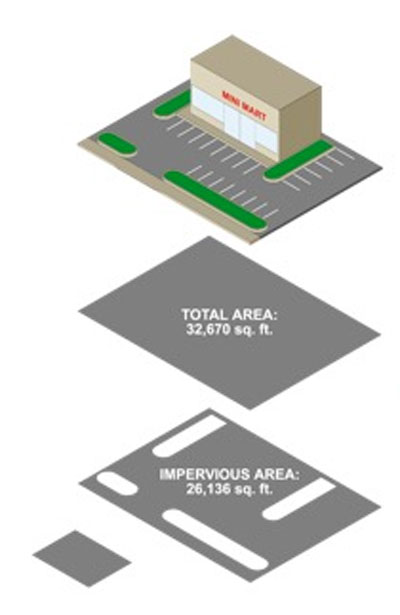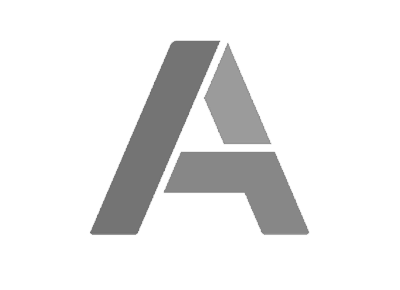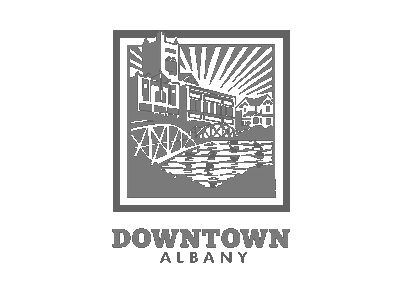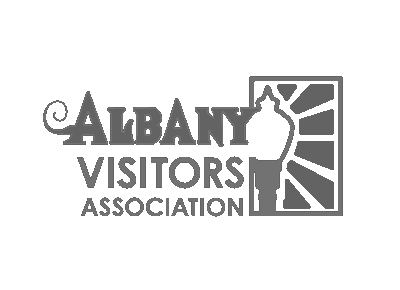Albany’s stormwater rate structure has two components: a base charge and an impervious surface charge. The base charge is the same for all accounts; everyone pays the same charge to recover the costs of billing and general stormwater system use. The impervious surface charge is based on the amount of impervious surface (roofs, pavement and gravel) on each property. A general description of how rates are calculated follow and more can be found in the stormwater rate resolution (Resolution 6676 for 2018 rates and Resolution 6713 for 2019 rates).
Single-Family Residential (SFR) Bill Calculation
For single-family residential properties, the impervious surface charge is the same for all customers and is based on the typical amount of impervious surface on single-family residential properties (Equivalent Residential Unit or ERU). Rates for single-family residential customers are also tiered where those customers with smaller structures pay slightly less and those with larger structures pay slightly more. In 2018, most single-family customers are in the middle tier and pay $7.08 per month.
| Base Charge | $5.03 | |
| + | Impervious Surface Charge ($2.05/ERU x 1 ERU) | $2.05 |
| = | Total Stormwater Bill | $7.08 |
Non-Single Family Residential (NSFR) Bill Calculation
For other properties (businesses, apartment complexes, government properties, etc.), the impervious surface charge is based on the number of Equivalent Residential Units (ERUs) of impervious surface present on the property. The number of ERUs is determined by calculating the amount of impervious surface on the property and dividing it by the typical impervious area found on residential properties in Albany (3,200 square feet). The number of ERUs is multiplied by the impervious surface rate per ERU.
This illustration shows an NSFR bill calculation using 2018 rates for a property that has 26,136 square feet of impervious surface:

| 26,136 sq. ft. of impervious surface | |
| ÷ | 3,200 sq. ft. / ERU* |
| = | 8.17 ERUs |
| Impervious Surface Charge: ($2.05/ERU x 8.17 ERUs) |
$16.75 | |
| + | Base Charge | $5.03 |
| = | Total Stormwater Bill | $21.78 |
Non-single family residential customers can also pursue specific credits in order to help reduce their bill. NSFR credits are possible for approved on-site structural stormwater controls that either reduce stormwater volume or improve stormwater quality. Examples of structural stormwater controls include bio-retention, vegetated filtration, infiltration, or media filter facilities. For new development or redevelopment projects to qualify for the credit, the installed BMP would have to exceed what is normally required as part of the development. All facilities would require prior approval by the City, and the maximum credit available will be 25% of the impervious surface charge.
Stormwater Rate Forecast
Albany’s stormwater utility was created in 2017. Stormwater fee adjustments in 2018 were limited to inflation (5%, $0.34 increase for average single-family residential (SFR) bill); adjustments in 2019 will also be limited to inflation (5%, $0.35 increase for average SFR bill). Adjusting for inflation, however, doesn’t address the growing backlog of unfunded system needs. Because of that, the City Council intends to incrementally raise rates beyond what’s required for inflation beginning in the spring of 2020.
Every year, the Council evaluates system needs, revenues, expenditures, and potential rate adjustments; sets goals; and considers options for meeting them over time. Each year’s evaluation includes a 5-year forecast of anticipated rate adjustments. The Council recently set a goal of generating $1.4 million more (today’s dollars) in annual stormwater rate revenue by 2024. This revenue will be needed for regulatory compliance and to free up street funds that have been used to build stormwater improvements:
- Regulatory Compliance ($300,000 to $1,000,000 per year) – The Oregon Department of Environmental Quality (DEQ) is expected to impose new stormwater requirements on Albany and other cities our size starting in January 2019. Complying with the proposed regulations could cost Albany rate payers an additional $1,000,000 per year. Albany staff believes the proposed requirements are unreasonable and we are working with various partners to communicate that to DEQ. We estimate complying with reasonable requirements would cost an additional $300,000 per year. Compliance with DEQ regulations is mandatory.
- Stormwater Improvements with Street Projects ($400,000 per year) - Albany staff estimate that approximately $400,000 in street funds is used every year to build stormwater improvements associated with street projects. Stormwater work must be done to meet regulatory requirements for stormwater quality and to replace undersized or aging pipes before streets are paved to avoid cutting through new pavement for pipe work. This is a justifiable expense, but the condition of Albany’s streets is declining, and those funds are needed for street maintenance.
The additional $1.4 million will address some unfunded needs in the stormwater system, but others remain, and they are substantial.
- Replacing Failing Pipes ($20,000,000 - $40,000,000) – Significant portions of Albany’s piped stormwater systems are failing. With only 50 percent of the system inspected, eight miles of pipe have been identified as failed or anticipated to fail within the next 10 years. Another mile of pipe needs significant maintenance and repair because roots have broken through it. Fixing those nine miles of pipe would cost an estimated $20,000,000. If the remaining 50 percent of the system is similar, the cost goes up to $40,000,000. If the work isn’t done, Albany streets will flood more often, sink holes will form and property will be damaged. A funding source for this work has not been identified. If costs for regulatory compliance are less than anticipated, a portion of the $1.4 million in additional revenue will be used to replace failing pipes.
- Capacity Increasing Projects (Costs TBD) – Some of Albany’s stormwater pipes are too small to handle the runoff from storms. The City is working on a stormwater master plan that will identify these pipes and determine how big they should be. The master plan will also identify the cost to install larger pipes. No funding is currently available for this pipe work.
To raise the $1.4 million, City staff estimates that stormwater rates will need to go up 17% per year, beginning in 2020. However, the City Council will consider actual adjustments annually, based on current revenue and expenditure information. Regulatory requirements alone could significantly impact planned rate adjustments.
If implemented as forecast, in 2024 an average SFR stormwater bill would be $16.30 per month. This table shows average monthly stormwater bills for a range of Albany customers today and with forecast increases through 2024.
SFR and NSFR Account Monthly Bills Forecast
| Customer | Current Fee | Adopted Fee (5% in March 2019) | Forecast Fee (17% in March 2020) | Forecast Fee (17% in March 2021) | Forecast Fee (17% in March 2022) | Forecast Fee (17% in March 2023) | Forecast Fee (17% in March 2024) |
|---|---|---|---|---|---|---|---|
| Single-family resident | $7.08 | $7.43 | $8.70 | $10.18 | $11.91 | $13.94 | $16.31 |
| Gas Station | $11 | $12 | $14 | $16 | $19 | $22 | $26 |
| City Hall | $31 | $33 | $38 | $45 | $52 | $61 | $72 |
| Apartment Complex | $68 | $72 | $84 | $98 | $115 | $134 | $157 |
| Large Retailer (average) | $358 | $375 | $439 | $515 | $602 | $705 | $825 |
| High School | $480 | $504 | $590 | $691 | $808 | $946 | $1,108 |
| Medium Manufacturer | $578 | $606 | $710 | $831 | $972 | $1,138 | $1,333 |
| Large Care Facility | $802 | $841 | $985 | $1,153 | $1,349 | $1,580 | $1,849 |
| Large Manufacturer | $1,442 | $1,512 | $1,772 | $2,074 | $2,426 | $2,841 | $3,326 |
This table shows Albany’s 2018 average bills compared to those in Salem, Corvallis and Eugene.
SFR and NSFR Community Comparison of Monthly Bills
| Albany | Salem | Corvallis | Eugene | |
|---|---|---|---|---|
| Single-family resident | $7.08 | $15.77 | $8.35 | $15.00 |
| Gas Station | $11 | $28 | $30 | $58 |
| City Hall | $31 | $83 | $124 | $235 |
| Apartment Complex | $68 | $187 | $299 | $567 |
| Large Retailer (average) | $358 | $995 | $1,655 | $3,127 |
| High School | $480 | $1,341 | $2,253 | $4,253 |
| Large Care Facility | $802 | $2,240 | $3,775 | $7,126 |
| Medium Manufacturer | $578 | $1,613 | $2,714 | $5,123 |
| Large Manufacturer | $1,442 | $4,017 | $6,713 | $12,679 |


